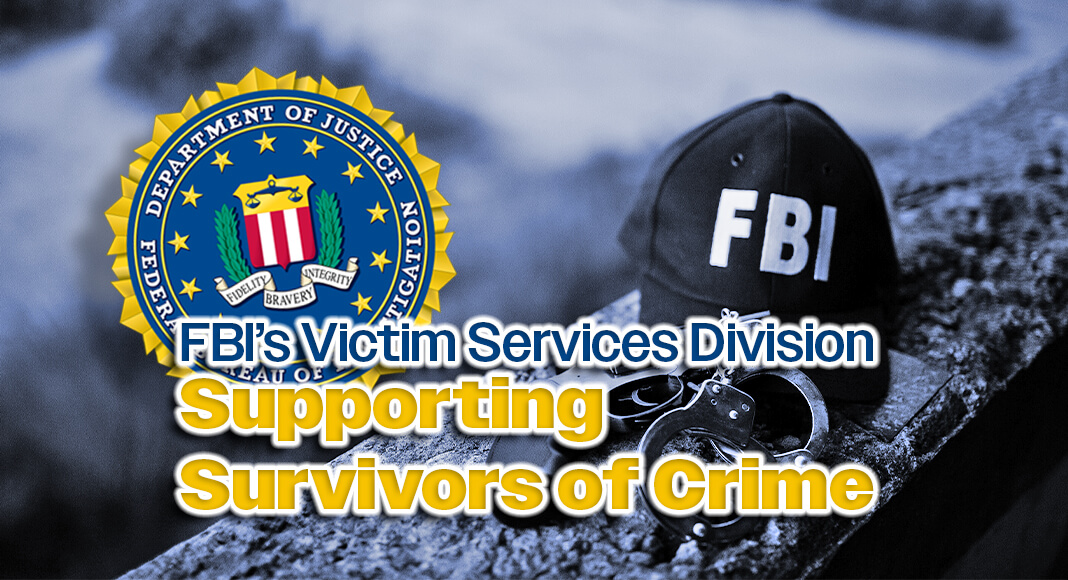
Texas Border Business
“How the FBI treats victims is a direct reflection of our core values. This is why we have specially trained personnel around the country to ensure victims of crimes are immediately supported in the aftermath of a crime by someone with knowledge of their community and the resources available to them,” said FBI Assistant Director Shohini Sinha, who leads the Bureau’s Victim Services Division (or VSD). “This National Crime Victims’ Rights Week, the FBI’s Victim Services Division reaffirms our commitment to assisting victims of federal crime—not just this week, but every day, all year, every year.”
Supporting victims of federal crimes takes a village—including victim specialists, victim services coordinators, child-adolescent forensic interviewers (CAFIs), and specialty teams overseen by VSD, as well as our domestic and international partners.
In honor of this week’s commemoration, here’s a look at how different parts of the VSD team uniquely support crime victims.
[Editor’s note: Employee names have been changed to protect their privacy.]
Did You Know?
U.S. tax dollars fund fewer than 20 positions within the FBI’s Victim Services Division—and none of its programs. The rest of these costs are covered by Department of Justice’s Crime Victims Fund—which, DOJ writes, “is financed by fines and penalties from convictions in federal cases.” You can visit this DOJ Office of Victims of Crime resource page to learn more.
Victim specialists
Victim specialists are based in one of the FBI’s 55 field offices across the country. There, they serve as victims’ primary points of contact with the Bureau.
“Navigating the criminal justice system can be really daunting,” Nina, a victim-advocate-turned-FBI-victim-specialist, explained. Victims’ trauma can make them feel isolated, scared, and insecure, she said. “There’s no guidebook to getting back the way you were,” she added.
That’s where victim specialists come in.
“Our role is to come alongside victims and show them the path forward after victimization,” Nina said. That role includes:
- Educating victims about their rights under federal law
- Assessing and meeting their unique needs—either independently or with the help of law enforcement or community partners—in the form of services, information, and referrals
- Sharing timely status updates about FBI cases
According to Nina, “no two days are ever the same” in the life of an FBI victim specialist. Skylar, another field-based victim specialist, agreed, explaining that an average day can start with administrative taskers and setting up interviews at the office, and end with “getting called out to a bank robbery.” “Your day needs to be ready for whatever’s coming your way,” she said.
Skylar was inspired to join the FBI after working side-by-side with the Bureau in the wake of the Boston Marathon bombing as a partner-agency employee. “That was the first time I found out the FBI had victim specialists,” she recalled of that historic response—when the FBI deployed 10 victim services personnel from across the country to support victims and their families.
“There’s no guidebook for getting back the way you were.”
Nina, FBI victim specialist
Victim services coordinators (VSCs)
VSCs provide essential support and crisis assistance to American victims of international and domestic terrorism. They support Bureau investigations for certain crimes that are committed beyond U.S. borders. These crimes most often involve victims of kidnapping and hostage-taking, terror attacks, and some international murder violations.
“We are on call 24/7/365 and always ready to get victims where they want to go and reunite with their loved ones,” said Jessica, who has served as an FBI victim services coordinator for eight years.
These coordinators support extraterritorial FBI squads and legal attaché offices in ensuring that victims:
- Have their rights upheld throughout a federal investigation
- Have their immediate needs met in the aftermath of a crime
- Receive coordinated support from the U.S. government after a crime
- Receive vital support services in the country where they were victimized (when possible)
- Receive continued support and resources when they’re back in the U.S.
- Have safe lodging and travel to return home
- Get access to emergency medical and mental health care
- Are referred to eligible programs that offer compensation to crime victims
Victim services coordinators accomplish this mission through collaboration with the U.S. Department of State, other federal agencies, international law enforcement partners, and other partners. “The process for engaging outside of U.S. soil is very different from engaging within, and so, access to victim services in other countries can be challenging, and in some cases nonexistent,” Jessica explained. For this reason, she said, taking care to work through partners in other U.S. government agencies and diplomatic channels is a significant part of the VSC’s role.
Jessica’s work has largely included responding to cases involving kidnappings and hostage takings and terrorist events around the globe. No matter where on Earth cases take her, she said, she’s found victim resilience to be a consistent throughline. “It is truly humbling to see people survive a truly horrific situation and find a way to survive it,” she said. “It’s an honor to walk them through some of the hardest times and get to see them come out on the other side. It’s amazing to be a part of that.”
“It’s an honor to walk them through some of the hardest times and get to see them come out on the other side.”
Jessica, FBI victim services coordinator
Child-adolescent forensic interviewers (CAFIs)
Sloane, who’s worked as an FBI CAFI for just under two decades—most recently, in a supervisory role—said an average day on the job is hard to encapsulate. “It’s hard to describe a day in the life of a CAFI because it varies, and that’s one of the beauties but also the challenges,” she said, adding that the job comprises far more than just conducting interviews.
It can also include:
- Consultation
- Court testimony
- Trainings
- Presentations
- Working Groups
- Working on multidisciplinary teams
And, Sloane stressed, CAFIs don’t work in a bubble. CAFIs are neutral fact-finders, but to accomplish that mission, they collaborate with FBI agents, task force officers, victim specialists, and prosecutors. “That’s the importance of working as a team to provide victims the best support possible to maneuver and survive this process,” she said.
Sloane and other supervisory CAFIs, in particular, also help resolve conflicts that might arise during the course of an investigation. Their job, in these situations, is to balance the best interest of the victim or witness in question with that of the case. SCAFIs also strategically divvy up resources to CAFIs scattered throughout the field to ensure they’re equipped to do their jobs.
“We don’t heal or succeed in isolation—that’s why there are really kind, authentic people to guide and support you,” Sloane said. “Your suffering matters, and we want to be here to assist in any way that we can.”
Victim Services Response Team (VSRT)
VSD also administers the FBI’s Victim Services Response Team (or VSRT). This team brings together special agents, intelligence analysts, victim specialists, and professional staff members to provide operational support when mass-victimization events or other crises strike.
Team members generally work their regular Bureau jobs until they’re called to support a VSRT response. Once they’re on the ground, they support state and local agencies in providing crisis assistance to victims and their families.
You can read this 2019 story to learn more about this unique team and major incidents it rapidly deployed in response to.
FBI crisis response canines (CRCs) and their handlers are also an integral part of VSRT deployments. You can read our 2016 story to learn about Wally and Gio, two CRCs who’ve deployed to the scene of mass shootings and other incidents to provide emotional support to victims.
“How the FBI treats victims is a direct reflection of our core values.”
Shohini Sinha, assistant director, FBI Victim Services Division
Victim Outreach Support and Strategy (VOSS) Program
The VOSS Program team creates and enacts strategies to communicate key notifications and resources to victims of crimes investigated by the FBI and to give victims the chance to share their experiences with law enforcement. Examples of communications spearheaded by VOSS include “Seeking Information” questionnaires and accompanying resource pages on fbi.gov.
You can read our 2024 story to learn more about how these strategic communications directly support FBI investigations into cases that victimize large groups of people.
Information source: FBI















